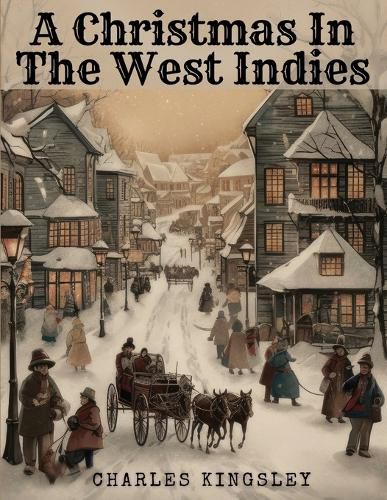Readings Newsletter
Become a Readings Member to make your shopping experience even easier.
Sign in or sign up for free!
You’re not far away from qualifying for FREE standard shipping within Australia
You’ve qualified for FREE standard shipping within Australia
The cart is loading…






This title is printed to order. This book may have been self-published. If so, we cannot guarantee the quality of the content. In the main most books will have gone through the editing process however some may not. We therefore suggest that you be aware of this before ordering this book. If in doubt check either the author or publisher’s details as we are unable to accept any returns unless they are faulty. Please contact us if you have any questions.
Chronicling his own journey from Southampton to the Spanish Main. Charles Kingsley was an English clergymen, novelist, and historian, best known perhaps for his book The Water Babies.
In At Last: A Christmas in the West Indies, Kingsley recounts his travels to the West Indies, largely focused on Trinidad, in 1869.
It is in many ways a typical 'travel' book of its time, rich in description and presenting an 'imperial' position and outlook on the colony, although as critics such as Claudia Brandenstein, Simon Gikandi and Catherine Hall have pointed out, this position is complicated and, as Kingsley was sympathetic to the idea of evolution and was one of the first to praise Charles Darwin, in some respects an ambivalent one.
Kingsley went to the West Indies with liberal and Christian sympathies, but he found it difficult to be objective about what he witnessed due to his theological background and intellectual tradition.
For example, he supported the strict control and supervision of the indentured Coolies, even though in England he was a strong advocate of emancipation and the creation of a '"moral bond"' between employee and employer.
Gikandi argues that Kingsley reached this conclusion about the West Indian context not because of what he saw there or because of his understanding of the Coolies' own views and perspectives.
"Rather the traveler reaches his conclusions from three mutually informing sources: official reports (both oral and written), intellectual Orientalism, and evolutionary doctrines."
$9.00 standard shipping within Australia
FREE standard shipping within Australia for orders over $100.00
Express & International shipping calculated at checkout
This title is printed to order. This book may have been self-published. If so, we cannot guarantee the quality of the content. In the main most books will have gone through the editing process however some may not. We therefore suggest that you be aware of this before ordering this book. If in doubt check either the author or publisher’s details as we are unable to accept any returns unless they are faulty. Please contact us if you have any questions.
Chronicling his own journey from Southampton to the Spanish Main. Charles Kingsley was an English clergymen, novelist, and historian, best known perhaps for his book The Water Babies.
In At Last: A Christmas in the West Indies, Kingsley recounts his travels to the West Indies, largely focused on Trinidad, in 1869.
It is in many ways a typical 'travel' book of its time, rich in description and presenting an 'imperial' position and outlook on the colony, although as critics such as Claudia Brandenstein, Simon Gikandi and Catherine Hall have pointed out, this position is complicated and, as Kingsley was sympathetic to the idea of evolution and was one of the first to praise Charles Darwin, in some respects an ambivalent one.
Kingsley went to the West Indies with liberal and Christian sympathies, but he found it difficult to be objective about what he witnessed due to his theological background and intellectual tradition.
For example, he supported the strict control and supervision of the indentured Coolies, even though in England he was a strong advocate of emancipation and the creation of a '"moral bond"' between employee and employer.
Gikandi argues that Kingsley reached this conclusion about the West Indian context not because of what he saw there or because of his understanding of the Coolies' own views and perspectives.
"Rather the traveler reaches his conclusions from three mutually informing sources: official reports (both oral and written), intellectual Orientalism, and evolutionary doctrines."